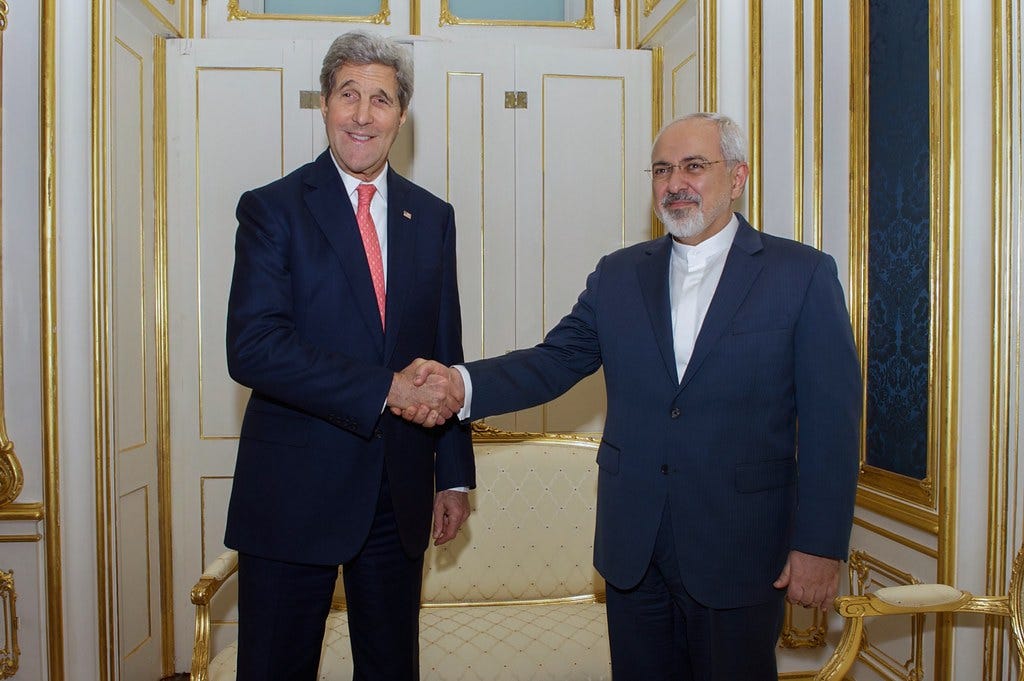Four Questions About the Iran/Kerry Allegations
Republicans have been quick to criticize the former secretary of state based on the word of someone they normally wouldn’t trust.
In a leaked recording of a three-hour-long conversation, Iran’s minister of foreign affairs, Javad Zarif—more rightly called Iran’s minister of propaganda—tells an interviewer that, when Donald Trump was president, former Secretary of State John Kerry told Zarif about Israeli strikes against Iran in Syria. Within hours, Republican officeholders and presidential hopefuls were tripping over one another to call for Kerry to be ousted from the Biden administration, in which he is working on climate-related policy and diplomacy. Republican-aligned news outlets were quick to bounce onto the bandwagon.
Kerry himself denies the allegations:


Considering the seriousness of the allegation and the untrustworthiness of its source, here are five questions that deserve answering.
1. Why was the interview leaked now? The Zarif interview has been leaked at a moment when Iran is two months away from its next presidential election and is negotiating with world powers about its nuclear program. Recorded a year ago as part of an oral history project, it was supposed to be embargoed until after the inauguration of the next administration in Iran, as the current administration is term-limited. The upcoming election is expected to be hotly contested between moderates and hardliners. The moderate camp, to which Zarif belongs, has always had a more U.S.-friendly base of support—but it may be worried that its demoralized base won’t turn out to keep it in power. So the leak might conceivably be a part of the moderates’ strategy to win by making the impression that the current U.S. administration gets along so well with the moderates that it is even willing to undermine America’s most important regional ally, suggesting that a possibility of better relations is on the horizon if the moderates get another term.
The full interview, if taken as authentic, suggests that there are tensions between the hardliners and the moderates in Iran. This has intelligence value, suggesting that finding defectors among reformists and moderates might not just be wishful thinking. Among the most interesting moments is when Zarif badmouths Qassem Soleimani, the slain-by-the-U.S. head of Iran’s Quds Force, for having undermined Zarif’s diplomatic efforts and coordinating strategy with Vladimir Putin just as Zarif was trying to warm relations with the United States. During the interview, Zarif explains that, no matter his own preferences, he was a mere administrator for the wishes of the Islamic Revolutionary Guard Corps (IRGC), which controls Iran’s politics.
The recording might also have been leaked for a foreign audience—with the aim of showing that the current administration is sincere in its efforts to engage diplomatically, as its time is running out. But Zarif’s suggestion that the IRGC calls the shots would seem to weaken that possibility.
One additional complicating point: The fact that it was initially leaked to Iran International, a London-based anti-regime network, suggests that the source intended to undermine the regime.
2. Is Zarif telling the truth? In the interview, Zarif says “It was America’s former secretary of state, John Kerry, who told me that Israel had launched more than two hundred attacks on Iranian forces in Syria.” (This is my own translation.) Again, Kerry has denied the allegation. Ned Price, the State Department spokesperson, told reporters that he “can’t speak to the authenticity” of the recording and “can’t speak to the accuracy” of Zarif’s claims, adding: “If you go back and look at press reporting from the time, this [Israel’s intensive involvement in Syria] certainly was not secret, and governments that were involved were speaking to this publicly on the record.” But the question remains, if it was public knowledge, then, why was it significant to Zarif?
3. Exactly what did Kerry tell Zarif? Did John Kerry leak classified information, or was he merely telling Zarif what was publicly known? One ought not to rush to judgment; the word of an Islamic Republic official regarding an American statesman is not the sort of thing we would normally presume to be true. Many on the right, including me, have spent years trying to explain to Americans that Iranian officials are deceitful liars and not to be trusted. But there must be an investigation into this to establish the truth.
4. If Zarif’s allegations are largely based on truth, what should we make of John Kerry? Kerry has admitted that he was in touch with Zarif while out of office. And we know that Kerry was trying to undermine the Trump administration in its relationship with Iran, in an attempt to protect his own legacy as one of the chief crafters of the Iran nuclear deal (the Joint Comprehensive Plan of Action).
If Kerry did leak classified information to Zarif, he should not just be fired from the administration, but also stripped of access to classified information. (The most recent precedent for such an action at the level of a cabinet officer is Sandy Berger, Bill Clinton’s national security advisor, who pleaded guilty to unauthorized removal of classified material after leaving office and lost his security clearance for three years.)
On top of this, there is 18 U.S. Code § 798, which governs the disclosure of classified materials, under which such a disclosure could result in a maximum ten years in prison. Finally, and at more of a theoretical level, the Logan Act of 1799, which prohibits diplomacy by unauthorized U.S. citizens and has not been used for a prosecution since the nineteenth century, could be brought into the mix.
Again: Zarif is not trustworthy. Kerry denies the allegation. And several important facts are unclear. But if an investigation determines that the allegation is not baseless, Kerry should be tried and , if found guilty, punished. If the Trump years have taught us anything, it’s that we must hold our public figures to account.


